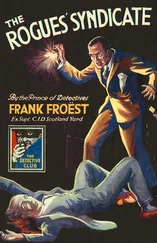'What's the matter? Are you-'
The voice of the technician was drowned by hissing and banging.
Eddie had blasted off the battery pods and sections of the hull. It was a last-ditch attempt to lose weight. The Deep Rover, minus its batteries and exostructure, started to spin and rise again. Then a powerful jolt shook it. Stone saw a rock appear beside him, a gigantic slab of seabed had catapulted upwards. Inside the capsule, things turned upside down. He heard the pilot scream as they were hit again, from the right this time, pushing them out of the blow-out. The Deep Rover instantly gathered speed and shot up. Stone clung to the armrests, practically lying in his seat. Eddie sagged towards him, eyes closed, blood running over his face. Stone realised with horror that now it was up to him. Frantically he tried to remember how to stabilise the submersible. He could switch the controls from Eddie to himself.
Eddie had shown him how to do it. It was that button there.
Stone pressed it, trying at the same time to push Eddie away from him. He wasn't sure that the thrusters would work now that the outer hull was gone. The numbers were whizzing past on the depth gauge, so he knew the submersible was still rising fast. In the end it didn't matter which direction they were heading in, so long as it was up – thank God there was no need to worry about decompression problems: the pressure in the capsule was kept at surface level.
A warning light flashed on.
The floodlights above the right-hand tank went out, then all the other lights. Stone was plunged into darkness.
He was shaking.
Calm down, he told himself Eddie showed you the emergency power supply. It's one of the buttons on the top row of the control panel. It either turns itself on or you have to do it manually. His fingers felt for the panel in the darkness.
What was that?
Now that the lights were out, it should have been pitch black. But something was shining.
Were they already that close to the surface? He'd checked the depth gauge before it went dark, and it had shown over 700 metres still to go. The submersible hadn't reached the top of the slope yet. They were well below the shelf break and beyond the reach of daylight.
He blinked.
A faint blue glow was emanating from the water, so faint he could barely be sure it was there. It loomed up from the depths, shaped like a funnel, tapering and disappearing into the darkness of the abyss. Stone held his breath. He could have sworn that the light would glow brighter if anyone approached. Now most of the light waves were swallowed by the water so it was still a long way off.
It had to be enormous.
The funnel started to move.
Its opening seemed to expand, while the rest of it swung round. Stone's fingers froze over the console in search of the power button.
He was mesmerised. It was bioluminescence – there was no doubt about it. Bioluminescence, filtered through millions of cubic metres of water and gas. But what kind of bioluminescent sea creature could grow to that size? A giant squid? The light in front of him was bigger than any squid – bigger than anyone could ever imagine a squid to be.
Or was it an optical illusion, caused by the sudden switch from light to dark, the ghostly traces of the rays from the floodlights?
The longer he stared at the thing, the paler it seemed to become. The funnel slid slowly into the depths.
Then it was gone.
Stone resumed his hunt for the emergency-power button. The submersible was rising steadily through the water, and he felt relieved at the thought of reaching the surface and putting the nightmare behind him. At least the video cameras hadn't been lost when Eddie fired off the hull. Had they caught the glowing thing? He wasn't sure if the technology was sensitive enough to detect such a weak signal.
But the glow had definitely been there. Then he remembered the peculiar footage that Victor had filmed, a creature retreating from the light. My God, he thought, what the hell have we unearthed?
Aha. He'd found the button.
The emergency-power supply clicked in with a hum. The lights on the console came on first, then the floodlights.
Eddie was lying, eyes wide open, next to him.
Stone was leaning towards him when something appeared in the light outside: an enormous sheet, cloudy-looking and reddish. It was coming towards the Deep Rover, and Stone's hand reached for the controls because he thought they were about to hit the slope.
Then he realised that the slope was going to hit them.
The slope was rushing towards them.
That was all he had time to think before the impact smashed the plastic sphere into a thousand tiny pieces.
BELL 430, Norwegian Sea
Since they'd left Trondheim the flight had become so bumpy that Johanson was having trouble giving Walt Whitman the attention he deserved. During the past half-hour the sky had darkened dramatically and was now bearing down on the helicopter as if it wanted to force it into the water. Fierce gusts buffeted them from side to side.
The pilot glanced round. 'Everything all right back there?'
'Couldn't be better' Johanson closed his book. The sea was plunged into a thick layer of fog but he could dimly make out the outlines of oil-rigs and boats. The swell must be high, he thought. A hefty storm was brewing.
'We'll be fine,' said the pilot.
'What's the forecast?'
'High winds.' The pilot glanced at the barometer on the control panel. 'Looks as though we're in for a hurricane.'
'Now you tell me.'
'Well, I didn't know before.' He shrugged. 'Weather forecasts aren't that reliable, you know. Are you afraid of flying?'
'Oh, no,' said Johanson, emphatically. 'It's just the thought of falling I don't like.'
'You won't be falling anywhere. For an offshore pilot, this stuff is child's play. We'll get a good shaking, but that's about all.'
'How long have we got?'
'We're half-way there already.'
'OK.' He opened his book again.
A thousand other noises were mixed with the roar of the engines. Bangs, whistles, crackles. There was even a ringing sound, which came at regular intervals from somewhere behind him. Amazing what the wind could do to the acoustics. Johanson turned towards the seat behind him, but the noise had stopped.
He focused on Walt Whitman.
Storegga Slide
Eighteen thousand years ago, at the peak of the last ice age, the sea level was some 120 metres lower than it was at the start of the third millennium. A large proportion of the world's water was trapped in glaciers, so the water pressure on the shelves was less intense. Some of the planet's seas hadn't yet formed, while during the glacial period others levelled out, some drying up entirely, leaving vast swathes of marshland in their wake.
One consequence of the worldwide drop in water pressure was its dramatic impact on the stability of gas hydrates. Vast quantities of methane were released in a short space of time, particularly in the upper regions of the slopes. The ice crystals that trapped and compressed the methane melted. For thousands of years the hydrates had held the slopes together, like glue, but now they acted like dynamite. As the methane escaped, it swelled to 164 times its former volume, breaking open crevices and craters as it pushed through the sediment to the surface, transforming the seabed into a porous, crumbling rain, incapable of supporting its own weight.
The continental slopes began to collapse, tearing swathes of shelf as they fell. Enormous landslides, carrying huge amounts of debris, hurtled hundreds of kilometres through the depths. Methane entered the atmosphere, causing disastrous climate change. But the slides had other, similarly drastic effects – not just on the sea, but on coastal regions and islands as well.
Читать дальше












